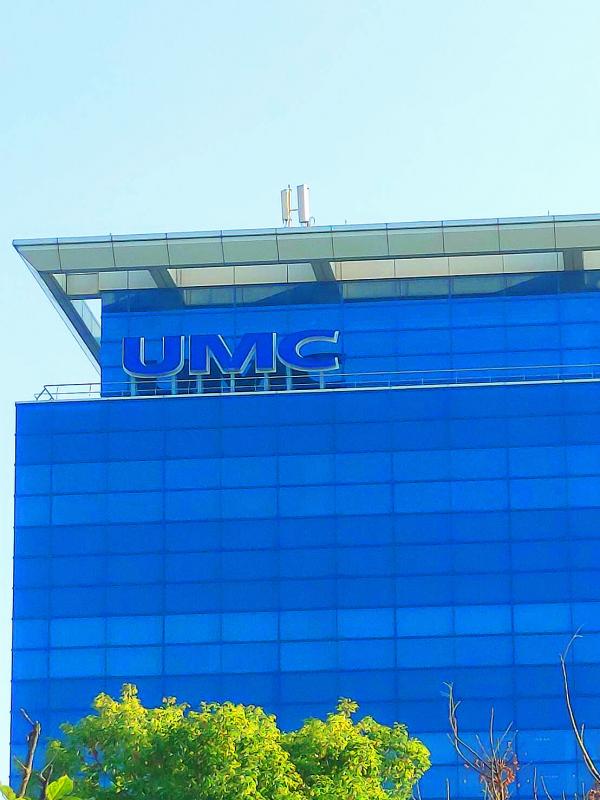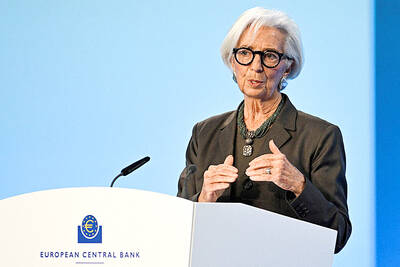The share prices of three major contract chipmakers, including United Microelectronics Corp (UMC, 聯電), were yesterday boosted by media speculation that the firms are in talks with customers to sign new multiyear supply agreements with fixed prices and volumes amid a dearth of chips.
Shares of UMC, the nation’s second-largest contract chipmaker, rose 1.78 percent to close at NT$62.8 in Taipei trading, while Vanguard International Semiconductor Corp (世界先進), a supplier of display driver ICs and power management chips, saw shares rise 0.34 percent to NT$149. Powerchip Semiconductor Manufacturing Corp’s (力積電) shares climbed 0.88 percent to NT$66.61.
The Chinese-language Economic Daily News yesterday reported that customers of UMC, Vanguard and Powerchip have agreed to buy chips at higher prices and fixed volumes for two to three years.

Photo: Grace Hung, Taipei Times
The new contracts would take effect next year, the report said.
This came after it was reported that the world’s top contract chipmaker, Taiwan Semiconductor Manufacturing Co (TSMC, 台積電), was hiking its prices by 20 percent as it wanted to maintain its gross margin at 50 percent or more.
TSMC shares increased 1 percent to NT$605 yesterday.
As chip shortages are expected to continue into next year, UMC last month said that more customers were discussing longer-term supply contracts to secure capacity at agreed prices and volumes.
In April, the Hsinchu-based chipmaker signed agreements with customers to invest NT$100 billion (US$3.6 billion) in expanding capacity, mostly for 28-nanometer chips, at a 12-inch fab, dubbed P6, at Tainan’s Southern Taiwan Science Park (南部科學園區).
The agreements would not take effect until 2023, when the P6 fab ramps up production in the second quarter of that year, UMC said.
The fab, which produces more than 87,000 12-inch wafers a month, would later upgrade to the 14-nanometer process, it said.
“The P6 [fab’s capacity] is covered by the contracts,” UMC told investors last month, adding that customers are required to put down an initial payment to secure capacity.
UMC said it expects demand to continue outpacing supply through the end of next year, driven by increasing demand for chips used in 5G-related applications, the Internet of Things and electric vehicles.
Capacity was tight at all of its technology nodes for 8-inch and 12-inch wafers, and its factories were fully utilized, the chipmaker said.
Vanguard said earlier this month that it had clinched long-term agreements with existing customers.
The contract terms would cover newly increased capacity only, it said, adding that customers were willing to pay higher prices to cover increases in manufacturing costs.

European Central Bank (ECB) President Christine Lagarde is expected to step down from her role before her eight-year term ends in October next year, the Financial Times reported. Lagarde wants to leave before the French presidential election in April next year, which would allow French President Emmanuel Macron and German Chancellor Friedrich Merz to find her replacement together, the report said, citing an unidentified person familiar with her thoughts on the matter. It is not clear yet when she might exit, the report said. “President Lagarde is totally focused on her mission and has not taken any decision regarding the end of

French President Emmanuel Macron told a global artificial intelligence (AI) summit in India yesterday he was determined to ensure safe oversight of the fast-evolving technology. The EU has led the way for global regulation with its Artificial Intelligence Act, which was adopted in 2024 and is coming into force in phases. “We are determined to continue to shape the rules of the game... with our allies such as India,” Macron said in New Delhi. “Europe is not blindly focused on regulation — Europe is a space for innovation and investment, but it is a safe space.” The AI Impact Summit is the fourth

CONFUSION: Taiwan, Japan and other big exporters are cautiously monitoring the situation, while analysts said more Trump responses ate likely after his loss in court US trading partners in Asia started weighing fresh uncertainties yesterday after President Donald Trump vowed to impose a new tariff on imports, hours after the Supreme Court struck down many of the sweeping levies he used to launch a global trade war. The court’s ruling invalidated a number of tariffs that the Trump administration had imposed on Asian export powerhouses from China and South Korea to Japan and Taiwan, the world’s largest chip maker and a key player in tech supply chains. Within hours, Trump said he would impose a new 10 percent duty on US imports from all countries starting on

STRATEGIC ALLIANCE: The initiative is aimed at protecting semiconductor supply chain resilience to reduce dependence on China-dominated manufacturing hubs India yesterday joined a US-led initiative to strengthen technology cooperation among strategic allies in a move that underscores the nations’ warming ties after a brief strain over New Delhi’s unabated purchase of discounted Russian oil. The decision aligns India closely with Washington’s efforts to build secure supply chains for semiconductors, advanced manufacturing and critical technologies at a time when geopolitical competition with China is intensifying. It also signals a reset in relations following friction over energy trade and tariffs. Nations that have joined the Pax Silica framework include Japan, South Korea, the UK and Israel. “Pax Silica will be a group of nations